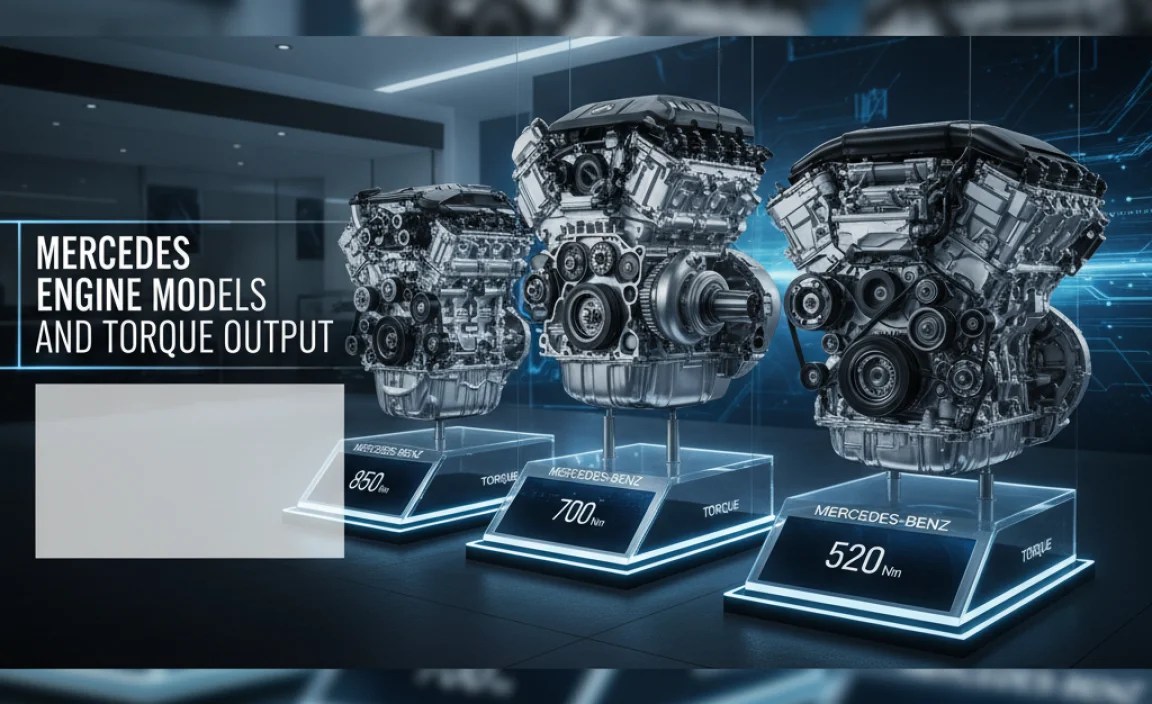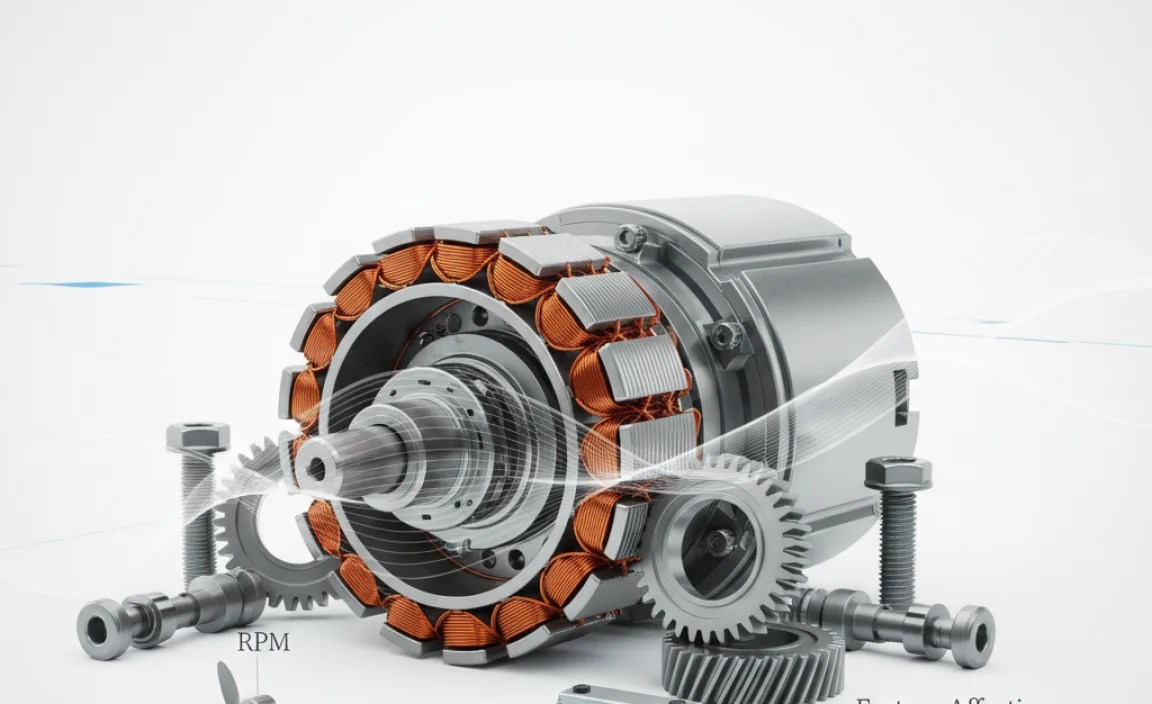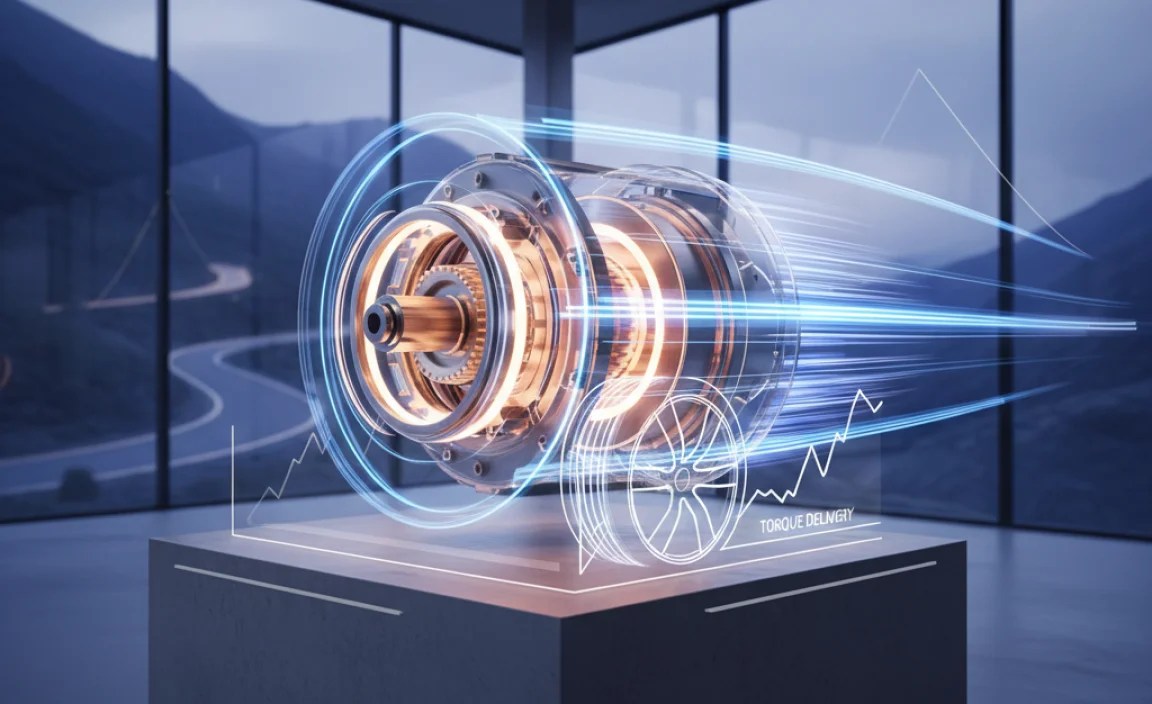Mercedes Motor Torque Models: A Beginner’s Guide
Quick Summary: Mercedes-Benz motor torque refers to the rotational force that its engines produce, directly affecting acceleration and towing capacity. Different Mercedes models offer varying torque levels based on engine type (e.g., inline-4, V6, V8) and tuning. Higher torque generally means quicker off-the-line performance and better responsiveness. Understanding these torque figures helps enthusiasts and buyers choose the right Mercedes for their driving needs.
Ever wondered what makes a Mercedes-Benz feel so powerful and responsive? A big part of the answer lies in engine torque. Torque is the rotational force that determines how quickly your car can accelerate and how well it can handle demanding situations like climbing hills or towing. If you’re a Mercedes owner or enthusiast, understanding torque is crucial for appreciating the performance of your vehicle. Many find the technical specs confusing, but don’t worry! This guide breaks down Mercedes motor torque models in simple terms, giving you the knowledge to make informed decisions and truly enjoy your ride.
In this article, we will cover:
- What torque is and why it matters in a Mercedes-Benz.
- Torque figures for various Mercedes engine models.
- How torque impacts driving performance and feel.
- Tips for optimizing torque in your Mercedes.
Understanding Torque: The Basics

Torque, in simple terms, is a twisting force that causes rotation. In the context of a car engine, torque is what turns the crankshaft, which in turn powers the wheels. The higher the torque, the greater the engine’s ability to perform work. This translates to quicker acceleration, better towing capability, and a more responsive driving experience.
Torque is measured in pound-feet (lb-ft) or Newton-meters (Nm). These units quantify the amount of force applied at a given distance from the axis of rotation. A higher number means more rotational force.
Here’s why torque is important for your Mercedes:
- Acceleration: Higher torque allows your car to accelerate more quickly from a standstill or at lower speeds.
- Towing: If you plan to tow trailers or boats, a high-torque engine is essential.
- Hill Climbing: Torque helps your car maintain speed when climbing steep inclines.
- Overall Driving Experience: A torquey engine feels more responsive and powerful, making driving more enjoyable.
Mercedes Engine Models and Torque Output

Mercedes-Benz offers a range of engines, each with different torque characteristics. These engines are designed to cater to various driving preferences and vehicle types. Let’s look at some common Mercedes engine models and their typical torque outputs.
Inline-4 Engines
Mercedes’ inline-4 engines are known for their efficiency and smooth power delivery. They are commonly found in models like the C-Class and E-Class.
Example: The M260 2.0-liter inline-4 turbo engine
- Typical Torque Output: 273 lb-ft (370 Nm)
- Applications: C300, E350
- Characteristics: Provides a good balance of power and fuel efficiency, suitable for daily driving.
V6 Engines
V6 engines offer more power and refinement compared to inline-4 engines. They are often found in higher-end models and offer a smoother, more luxurious driving experience.
Example: The M276 3.0-liter V6 biturbo engine
- Typical Torque Output: 354 lb-ft (480 Nm)
- Applications: E400, GLE450
- Characteristics: Delivers strong and consistent power across a wide RPM range, ideal for both city and highway driving.
V8 Engines
Mercedes’ V8 engines are synonymous with high performance and luxury. These engines provide exhilarating acceleration and a distinctive exhaust note.
Example: The M177 4.0-liter V8 biturbo engine (AMG)
- Typical Torque Output: 487 lb-ft (660 Nm) to over 600 lb-ft (813 Nm) in higher performance variants.
- Applications: C63 AMG, E63 AMG, S63 AMG, G63 AMG
- Characteristics: Offers incredible power and responsiveness, designed for high-performance driving.
Diesel Engines
Diesel engines are known for their high torque output at low RPMs, making them excellent for towing and fuel efficiency.
Example: The OM654 2.0-liter inline-4 diesel engine
- Typical Torque Output: 295 lb-ft (400 Nm)
- Applications: C220d, E220d
- Characteristics: Provides strong low-end torque, making it ideal for fuel-efficient and relaxed driving.
Here is a table summarizing the torque outputs of various Mercedes engine models:
| Engine Model | Type | Typical Torque Output (lb-ft) | Applications |
|---|---|---|---|
| M260 2.0L Inline-4 Turbo | Gasoline | 273 | C300, E350 |
| M276 3.0L V6 Biturbo | Gasoline | 354 | E400, GLE450 |
| M177 4.0L V8 Biturbo (AMG) | Gasoline | 487-600+ | C63 AMG, E63 AMG, S63 AMG, G63 AMG |
| OM654 2.0L Inline-4 Diesel | Diesel | 295 | C220d, E220d |
Factors Affecting Torque Output

Several factors can influence the torque output of a Mercedes engine. Understanding these factors can help you appreciate the nuances of your vehicle’s performance.
- Engine Size: Generally, larger engines produce more torque. A V8 engine will typically have higher torque than an inline-4 engine.
- Turbocharging/Supercharging: Forced induction systems like turbochargers and superchargers can significantly increase torque output by forcing more air into the engine.
- Engine Tuning: Manufacturers can tune engines to optimize for either horsepower or torque. AMG models, for example, are often tuned for maximum torque.
- Fuel Type: Diesel engines tend to produce more torque at lower RPMs compared to gasoline engines.
- Exhaust System: A well-designed exhaust system can improve engine breathing and increase torque.
How Torque Impacts Driving Performance and Feel

The torque output of your Mercedes engine directly affects how the car feels and performs in various driving situations.
Acceleration and Responsiveness
High torque translates to quicker acceleration. When you press the accelerator pedal, the engine responds immediately, providing a surge of power that propels the car forward. This is particularly noticeable at lower speeds, making city driving more enjoyable.
Towing Capability
If you plan to tow trailers, boats, or other heavy loads, a high-torque engine is essential. Torque provides the pulling power needed to move heavy objects without straining the engine.
Hill Climbing
Torque helps your Mercedes maintain speed when climbing steep hills. Without sufficient torque, the engine may struggle, causing the car to slow down. A torquey engine can effortlessly conquer inclines.
Daily Driving
Even in everyday driving situations, torque plays a crucial role. It makes merging onto highways, overtaking other vehicles, and navigating traffic easier and more confident. A responsive engine ensures that you always have the power you need.
Optimizing Torque in Your Mercedes

If you’re looking to enhance the torque output of your Mercedes, several options are available. These modifications can improve performance and make your driving experience even more thrilling.
ECU Tuning
ECU (Engine Control Unit) tuning involves reprogramming the engine’s computer to optimize performance. A professional tuner can adjust parameters such as fuel injection, ignition timing, and boost pressure (for turbocharged engines) to increase torque.
Pros:
- Significant torque gains
- Improved throttle response
- Customizable tuning options
Cons:
- Can void warranty
- Requires professional expertise
- Potential for engine damage if not done correctly
Exhaust System Upgrades
Upgrading to a high-performance exhaust system can improve engine breathing and increase torque. Aftermarket exhaust systems are designed to reduce backpressure and allow exhaust gases to flow more freely.
Pros:
- Increased torque and horsepower
- Improved exhaust note
- Enhanced engine efficiency
Cons:
- Can be expensive
- May require professional installation
- Some systems may be too loud for street use
Air Intake Upgrades
Installing a cold air intake can improve airflow to the engine, resulting in increased torque and horsepower. Cold air intakes typically replace the factory airbox with a more efficient system.
Pros:
- Increased torque and horsepower
- Improved throttle response
- Enhanced engine sound
Cons:
- May require professional installation
- Some systems may not be street legal
Forced Induction Upgrades
For turbocharged engines, upgrading the turbocharger can significantly increase torque output. Larger turbochargers can deliver more boost, resulting in substantial performance gains.
Pros:
- Significant torque and horsepower gains
- Improved acceleration
Cons:
- Expensive
- Requires professional installation
- May require other supporting modifications
Note: Always consult with a qualified mechanic or tuner before making any modifications to your Mercedes. Improper modifications can damage your engine and void your warranty.
Real-World Examples of Mercedes Torque
To further illustrate the importance of torque, let’s consider some real-world examples of how it affects the driving experience in different Mercedes models.

Mercedes-Benz C300
The C300, equipped with a 2.0-liter inline-4 turbo engine, provides a balanced driving experience. Its 273 lb-ft of torque ensures that the car accelerates smoothly and responsively, making it ideal for daily commuting and city driving. The torque is readily available at lower RPMs, which means you don’t have to rev the engine high to get the power you need.
Mercedes-Benz E400
The E400, powered by a 3.0-liter V6 biturbo engine, offers a more refined and powerful driving experience. With 354 lb-ft of torque, the E400 accelerates quickly and effortlessly. This makes it well-suited for longer journeys and highway driving, where you need to pass other vehicles or climb hills with ease. The V6 engine delivers smooth and consistent power across a wide RPM range.
Mercedes-AMG C63
The AMG C63, with its 4.0-liter V8 biturbo engine, represents the pinnacle of performance. Its 479 lb-ft to 516 lb-ft (depending on the variant) of torque provides exhilarating acceleration and unmatched driving dynamics. The C63 can launch from 0 to 60 mph in just a few seconds, making it a true sports car. The high torque output ensures that the car is always ready to unleash its power, whether you’re on the track or the open road.
Mercedes-Benz GLE 350 d
The GLE 350 d, featuring a diesel engine, excels in providing robust torque at low RPMs. Its engine is engineered to deliver high torque output from the moment you press the accelerator. This characteristic is especially advantageous for towing or navigating off-road terrains, where consistent power is crucial.
Tips for Maintaining Optimal Torque
To ensure your Mercedes-Benz consistently delivers its maximum torque, proper maintenance is essential. Here are some tips to help maintain optimal torque performance:
- Regular Oil Changes:
Ensure timely oil changes using the recommended oil type and viscosity, as clean oil reduces friction and maintains engine efficiency. - Air Filter Maintenance:
Keep the air filter clean to ensure proper airflow into the engine. A clogged air filter restricts airflow, reducing engine performance and torque output. - Spark Plug Replacement:
Replace spark plugs according to the manufacturer’s recommended intervals. Worn spark plugs can lead to misfires, reducing engine efficiency and torque. - Fuel System Cleaning:
Use fuel system cleaners periodically to remove deposits from fuel injectors and other components. Clean fuel injectors ensure proper fuel delivery, maintaining optimal engine performance. - Check and Replace Belts and Hoses:
Inspect belts and hoses regularly for wear and tear. Replace them as needed to prevent leaks and ensure all engine components function correctly, contributing to consistent torque output. - Monitor Engine Performance:
Pay attention to any unusual sounds or changes in engine performance. Address any issues promptly to prevent further damage and maintain optimal torque delivery.
Common Misconceptions About Torque
There are several common misconceptions about torque that can lead to confusion. Let’s debunk some of these myths:
- Torque is the same as horsepower:
Torque and horsepower are related but different. Torque is the rotational force, while horsepower is the rate at which work is done. Horsepower is calculated from torque and RPM. - More torque always means a faster car:
While torque is important for acceleration, other factors such as weight, aerodynamics, and gearing also play a significant role in determining a car’s speed. - Diesel engines are only good for towing:
While diesel engines excel at towing due to their high torque at low RPMs, they are also fuel-efficient and can provide a smooth and relaxed driving experience. - You can significantly increase torque with simple bolt-on modifications:
While modifications like exhaust and intake upgrades can increase torque, the gains are often modest. Significant torque increases usually require more extensive modifications such as ECU tuning or forced induction upgrades.
FAQ: Mercedes Motor Torque Models
What is torque in a car engine?
Torque is the rotational force that turns the engine’s crankshaft, which then powers the wheels. It determines how quickly your car can accelerate and how well it can handle loads.
Why is torque important for my Mercedes?
Torque affects acceleration, towing capacity, hill climbing, and overall driving experience. Higher torque makes your car feel more responsive and powerful.
What is a good torque output for a Mercedes-Benz?
A good torque output depends on the engine type and vehicle. For example, a 2.0-liter inline-4 engine might have around 273 lb-ft of torque, while a 4.0-liter V8 engine could have over 487 lb-ft.
Can I increase the torque of my Mercedes engine?
Yes, you can increase torque through modifications like ECU tuning, exhaust system upgrades, and air intake upgrades. However, consult with a professional before making any changes.
Do diesel engines have more torque than gasoline engines?
Yes, diesel engines typically produce more torque at lower RPMs compared to gasoline engines. This makes them excellent for towing and fuel efficiency.
Will increasing torque void my Mercedes warranty?
Modifications that increase torque can potentially void your warranty, especially if they cause damage to the engine or other components. Check with your dealer before making any changes.
How do I maintain optimal torque in my Mercedes?
Maintain optimal torque by performing regular oil changes, keeping the air filter clean, replacing spark plugs as needed, and using fuel system cleaners periodically.
Conclusion
Understanding Mercedes motor torque models is essential for appreciating the performance and capabilities of your vehicle. Torque affects everything from acceleration to towing capacity, influencing your overall driving experience. By familiarizing yourself with the torque outputs of different Mercedes engines and the factors that affect them, you can make informed decisions about maintenance, modifications, and future vehicle purchases. Whether you’re a seasoned enthusiast or a new owner, grasping the concept of torque will undoubtedly enhance your enjoyment and understanding of your Mercedes-Benz. So, next time you’re behind the wheel, remember the power of torque and how it contributes to the unique driving experience that Mercedes-Benz delivers.
For more in-depth information on Mercedes-Benz engines, visit reputable automotive resources like Edmunds or Car and Driver.



